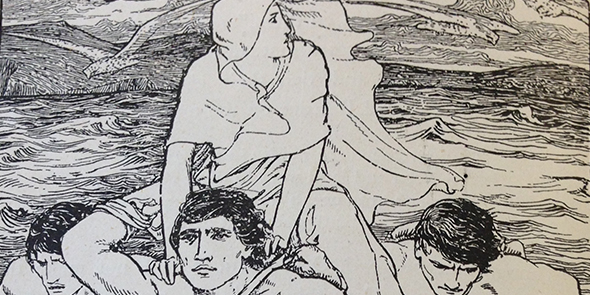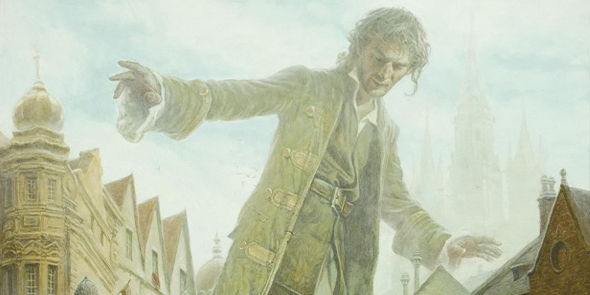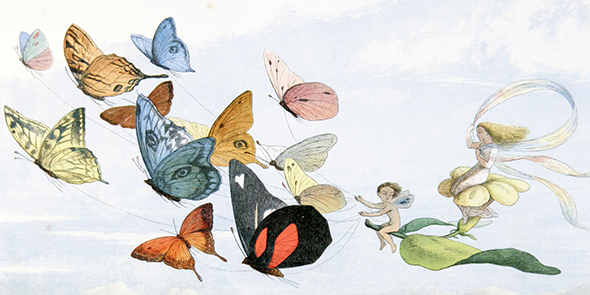M.Phil. in Children’s Literature
1 Year Full-Time or 2 Year Part-Time
Children’s literature is a broad category, encompassing everything from picturebooks to Young Adult fiction, from four-hundred-year-old texts to the latest publications. This taught master’s programme addresses its various genres, readerships, publishing trends and modes of criticism. The core module gives a thorough grounding in the field. Option modules enable you to forge your own path of study. Completing a dissertation, under expert supervision, allows you to develop your own research interests. While the focus is on literary analysis, for the last number of years the programme has also offered a creative writing option module.
Situated in Dublin, a UNESCO City of Literature, and taught within a world-leading School of English, the programme pays special attention to the role of the Irish contribution to the development of children's literature in English. The course also places a particular emphasis on archival research, allowing students to explore Trinity’s Pollard Collection of Children’s Books – the largest collection of children’s books in Ireland – as well as working with the award-winning National Collection of Children’s Books project. The faculty are recognized nationally and internationally as experts in the field.
Exploring the extensive Pollard Collection of Children’s Books, which is housed in Trinity College, felt like accessing a portal to the past and that amazing insight into what children of the eighteenth, nineteenth and early-twentieth centuries saw and felt and experienced is something that I will always treasure

The focus on individual research is fostered by lecturers who are experts in their field, enthusiastic about their work, and helped guide me through the challenges of essay and dissertation writing.
Course Structure
The centrepiece of the course is the core ‘Perspectives and Case Studies in Children’s Literature’ module, which runs across two semesters. Covering a wide range of texts and genres, contexts and concepts, it addresses some of the major trends in the writing and reception of children’s literature from across the centuries. This survey module will introduce students to diverse topics such as histories, theory and criticism, collections and archives, myth, landscape, theatre, fairytales, picturebooks, gender and sexualities, young adult literature, fantasy, school stories, and so on. Students will have the opportunity to engage in the close analysis of English-language texts from around the world in a way which offers both breadth and depth of research. The topics of the core module are presented in a two-hour seminar each week. Further foundational grounding in issues of importance to studying and researching English literature at postgraduate level is provided through the ‘Research Skills for Postgraduate English’ and ‘Mapping the Literary Field’ modules. Full-time students will have approximately six contact hours per week.
Students also take two specialist option modules, reflecting our commitment to cutting-edge research-led teaching. In recent years, the children’s literature options have included: ‘The Victorian Child’, ‘The City and Children’s Literature’, ‘Material Culture and Children’s Literature’, and ‘Creative Writing for Children’. A wealth of option modules from our other M.Phil. programmes will also be available to you. In the final phase of the course, you will complete a dissertation. This will allow you to pursue in-depth research on a subject of your choice under expert supervision and drawing on our fantastic library and archival holdings.
Teaching and Assessment
Teaching for the course is primarily delivered through small group seminar teaching. Current staff teaching on the programme include Dr Jane Carroll (co-director), Dr Pádraic Whyte (co-director), Dr Jarlath Killeen, and the acclaimed author for young people Dr Sheena Wilkinson, all of whom are recognised internationally for their publications and expertise in the area of children’s literature studies. Modules are assessed by essay or other written coursework. The final phase of the course sees student’s undertake independent research and write a 15-16,000-word dissertation. Students taking the course part-time complete the three core modules in their first year of study. In their second year, they complete two option modules and their dissertation.
Students also often have the opportunity to attend additional lectures and workshops offered by guest speakers and visiting academics. In recent years, many experts and authors in children's literature have spoken at Trinity, including Sarah Crossan, John Grogan, Jerry Griswold, Peter Hunt, Donna Jo Napoli, Perry Nodelman, Kimberley Reynolds, Katie Trumpener, Louise O’Neill, Emer O’Sullivan, Siobhán Parkinson, and Timothy Young.
Admissions Information
Students of many different nationalities and from diverse backgrounds and disciplines have successfully completed the programme. Applicants should have a good honours degree (at least an upper second or a GPA of at least 3.3). Applicants must also submit a single critical writing sample of 3,000-5,000 words as part of their application. An application without a critical writing sample will be treated as incomplete. A writing sample should demonstrate the ability to critically analyse a text or texts (this may or may not be a text written for children). The writing sample can be a new essay, or an essay you have already submitted as part of your undergraduate degree.
Applications for admission in 2024/25 open in November 2023. Candidates are encouraged to submit applications as soon as possible, as applications are reviewed on a rolling basis as they arrive. The closing date for admission is 31 March 2024. It is the applicant’s responsibility to ensure that all materials are submitted correctly. We recommend that students follow up with referees to ensure that references are uploaded in a timely fashion (ideally within two weeks of the submission of your application).
During the summer the Course Directors will write to all successful applicants who have accepted offers, providing information about course content and reading lists. The 2024/25 academic year will start in September 2024.
Funding
Postgraduate students researching any aspect of children's literature are eligible to apply for the annual Yale-TCD Bursary for Research in Children's Literature. Approximately €3,500 will be made available to facilitate travel to work on the Betsy Beinecke Shirley Collection of American Children's Literature at Yale University. This covers costs for a four-week stay (approximately) in the USA. This bursary is jointly funded by the School of English (TCD) and the Beinecke Library (Yale).
The Peter Irons Taught Postgraduate Studentships
The studentships will contribute towards M.Phil. tuition fees (EU or Non-EU) for any School of English taught postgraduate programme. They are generously funded in memory of Peter Irons. Two studentships will be awarded for the academic year: one for an EU student, and one for a non-EU student. For further information, please open this PDF link.
European Excellence Awards
The €1,000 awards are open to applicants with EU fee-status who hold an offer letter for a Postgraduate Taught Masters programme in Trinity College Dublin. Further information can be found here.
Details of further funding opportunities can be found here.
Brontë Prize
This prize was founded in 1921 by a bequest from Miss A.G. Woolson of Portland, U.S.A. It is awarded triennially by the Board on the recommendation of a committee for the best essay on either (a) an English author of Irish descent, or (b) the seats of learning in Ireland prior to 900 A.D. or (b) the seats of learning in Ireland prior to 900 a.d. The committee consists of the Regius Professor of Greek and the Professors of Latin and English Literature. A candidate must be of Irish birth or have been domiciled in Ireland for at least ten years. The candidate must also be an undergraduate of the University or a graduate of not more than five years’ standing. The next award will be made in 2022 and essays must reach the Registrar before 1 October 2022. Value, €1,905.
Dublin Cost of Living
Whether you're moving to Dublin from Ireland or abroad, the biggest problem you're likely to face is just getting set-up in the city. Below, you'll find web links providing advice on getting accommodation, placing deposits, household utilities, looking after your finances, and general tenancy agreements.
https://www.tcd.ie/students/living-dublin/
https://www.tudublin.ie/for-students/student-life/cost-of-living-guide/
https://www.internationalstudents.ie/info-and-advice/practical-information/cost-of-living




